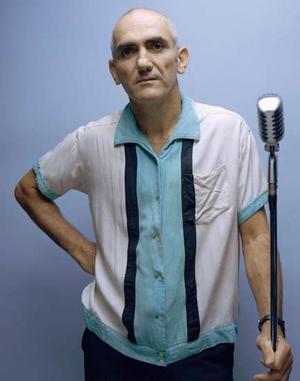Music |
Paul Kelly
By
Published: May 20, 2013
Category:
Rock
When Guest Butler Julia May asked about celebrating Paul Kelly, he wasn’t even a name to me. Then I listened to ‘They Thought I Was Asleep’ and understood why Australians say he’s a national treasure. Scroll down, listen, shake your head at the pictures he can sing. National treasure, indeed.
Julia is a co-founder of The Bulb, an Australian online publication about inspired living. She’s also a journalist, having most recently been the London correspondent for The Age and Sydney Morning Herald in Australia. She is working on her first novel.
As I sat in Melbourne’s Palais Theatre recently watching Paul Kelly, I thought, “The whole world should know him. Why don’t they?“ He’s doing his part, a tour of the US and Europe. Now I’ll do mine.
The first thing to know about Paul Kelly — really, the most important thing to know — is what his strength is as a singer and songwriter. It’s this: He articulates the feelings you know but cannot name, conjuring the first, worst, best, most lusty or loneliest love; that person’s smell, the particular flavor of that heartbreak. He also transports you into other bodies, other lives.
“They Thought I Was Asleep” is the story of a long-forgotten nighttime car ride, the one when your parents‘ misery was stripped bare.
In “From Little Things Big Things Grow,” he stands with the Aborigines deprived of their land.
The family Christmas? In ”How to Make Gravy,” the singer is in prison, writing to his brother on December 21st. He fears his brother will steal his wife. He misses the kids. The remorse is a punch in your guts.
What links the songs is the life experience. Paul Kelly roamed around the pubs of Melbourne, building his repertoire and his laconic, even languid, performing style, and nursing the heroin addiction that he‘s only kicked in the last few years — his face has the look of the mean streets about it. In the ‘80s, he moved to Sydney, forming his first well-known band: Paul Kelly and the Coloured Girls.
But it was Melbourne, my hometown, that drew him back and forms the backdrop for songs such as “From St Kilda To King’s Cross,” in which he would trade all of spectacular Sydney Harbour for St Kilda’s gritty promenade. He has mainly stuck to a solo career in the past three decades, but has played or written with just about every terrific Australian musician. [To buy Paul Kelly’s most recent CD from Amazon, click here. For the MP3 download, click here.]
Kelly is demonstrably Australian. He explores and very simply but beautifully illustrates this country’s culture and landscape. But his music is a soundtrack to life wherever it is lived, with no age bracket necessary. In university pubs, I danced — badly, drunkenly, and too close to the jukebox — to “Dumb Things.”
I mulled the apologies of a crazy boyfriend with “To Her Door” on rotation (and finally turned him away).
My beloved and I choreographed our bridal waltz to “Down to My Soul” at 3AM two nights before the wedding. The lyrics; ‘You wake me up / Speaking dreams at dawn/ I reach and touch/ The fine lines time has drawn/ For all the world I wouldn’t change my place/ Your mixed-up tears Falling on my face.’ This verse, from that song, is perhaps my favorite from all of Kelly’s songs; if this does not speak of a lasting partnership, what does?
"When I First Met Your Ma,” written as a letter from a father to his child, was not necessarily intended as a lullaby, but sends my 8-month-old daughter’s eyelids fluttering when hummed by her father. I love that I am the woman in the song.
Kelly’s skill as a songwriter lies in its contrasts: the lyrics are minimalist, yet deep. Poetic, but in an everyman way. Poignant, but frequently funny. He draws inspiration from the short stories of Raymond Carver. Indeed, in his magnificent autobiography, How To Make Gravy: A to Z, A Mongrel Memoir, which also doubles as the liner notes for every song he’s ever written, he says this:
Short stories have much in common with songs. Both need to carry their weight lightly. And Carver’s stories in particular are a perfect model for a certain kind of songwriter. They’re lean, clipped, mysterious, with a lot happening around the edges.
I wanted to write modern love songs, sing all kinds of love — old love, young love, complicated love, happy love, sad love, carnal love, yearning love, hanging-on love, hanging-in love, out-of-control love, love gone wrong, love pretty right, love between friends, love among families, love of home, love of the unknown, love of clan, love of enemies, love of drinking, love of oblivion, love of pain.
As I sat at the Palais Theatre, by the sea in Kelly’s treasured St Kilda, this man I have known a long time still managed to grab me with surprise. He was performing with Neil Finn, of Crowded House. It was all pretty great but it was when he took "Into Temptation,” one of Finn’s best-known songs, that the tears popped from their ducts. Kelly made it his, and better than the original.
Be warned: A few songs, and Paul Kelly can form part of your life’s soundtrack.


